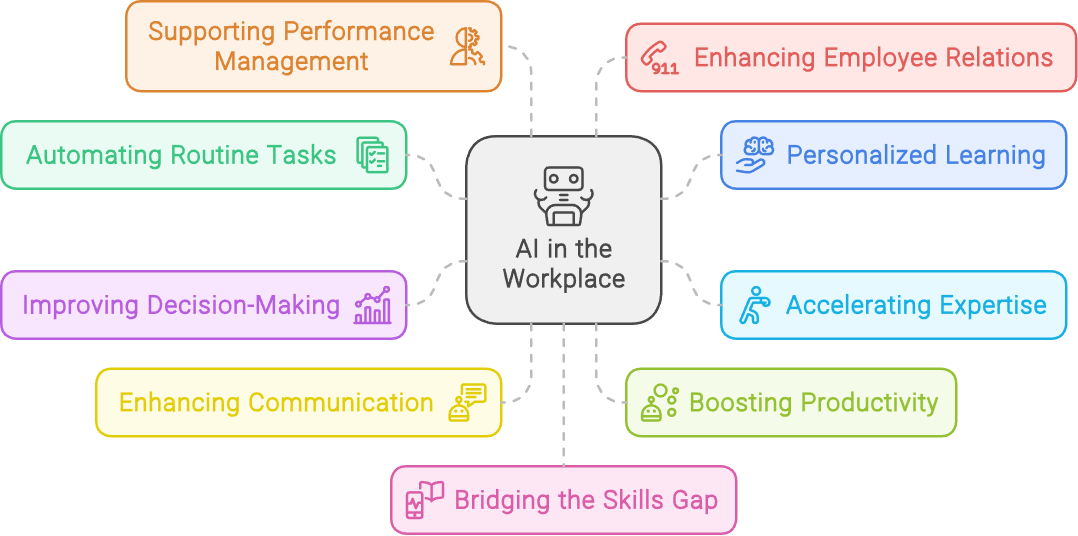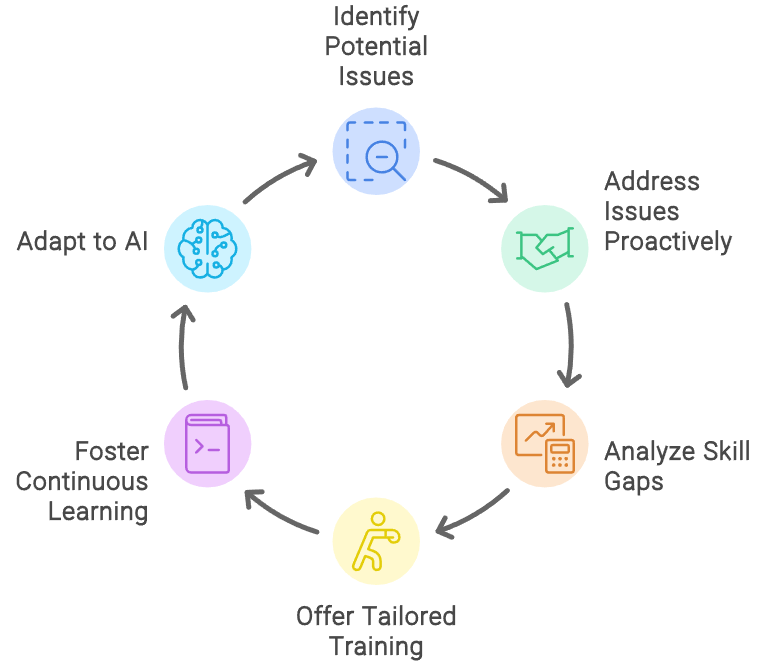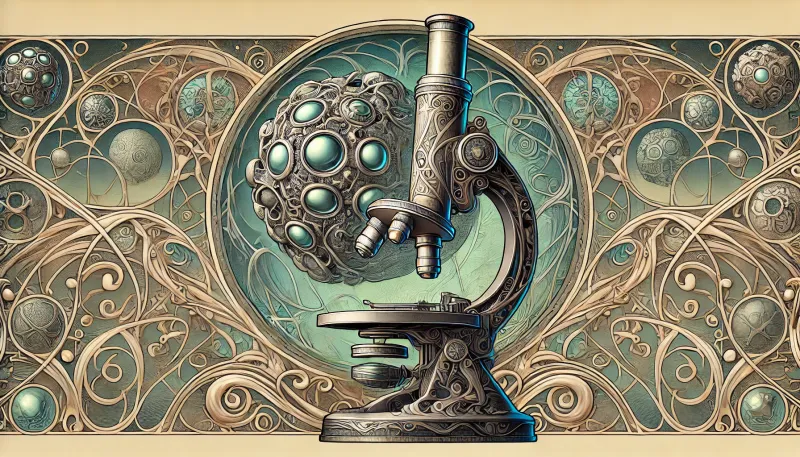With the current job market as it is, especially with 17% of Spotify's staff being laid off, the drive to stand out and excel in one's career is more significant than ever. The rise of Artificial Intelligence (AI) and its integration into various professional settings have transformed how we approach our jobs, manage tasks, and maximize productivity. As businesses seek innovative solutions to gain a competitive edge, AI promises not only to streamline operations but also to elevate individual performance.
1. Automating Routine Tasks for Enhanced Productivity
One of the most immediate benefits of AI in the workplace is its ability to automate routine tasks. AI tools can handle mundane activities like data entry, scheduling, and basic customer service inquiries, freeing employees to focus on more complex and creative work. For instance, generative AI tools can enable customer service agents to manage more inquiries per hour, significantly improving overall productivity (Stealthesethoughts, 2023).
2. Personalized Learning and Skill Development
AI-driven learning platforms are revolutionizing how employees develop skills. These platforms analyze individual strengths and weaknesses, creating personalized learning pathways that are tailored to the employee's needs. This approach not only makes learning more efficient but also ensures that employees can close skill gaps quickly, positioning themselves for career advancement (LinkedIn, 2024).
3. Accelerating Expertise with AI Support
AI tools can expedite the learning process, enabling employees to reach expertise levels much faster than traditional methods. For example, customer support agents using AI tools can achieve proficiency in handling inquiries within a few months, a process that would typically take much longer without AI support (Accenture, n.d.).

4. Improving Decision-Making with Data Analytics
AI enhances decision-making by providing data-driven insights that are both accurate and timely. AI tools can analyze vast amounts of data, identifying patterns and trends that might not be apparent to the human eye. This capability is particularly valuable in strategic planning, where informed decisions can make the difference between success and failure (reworked.co, 2024).
5. Enhancing Communication with AI-Powered Tools
Effective communication is crucial in any workplace, and AI tools like Grammarly can help ensure that all written communications are clear, concise, and error-free. These tools not only save time but also improve the quality of internal and external communications, leading to better collaboration and engagement (Stealthesethoughts, 2023).
6. Boosting Productivity with Intelligent Assistants
Intelligent virtual assistants powered by AI can significantly boost productivity by managing schedules, setting reminders, and even handling emails. These assistants can learn from user behavior, becoming more efficient over time and allowing employees to focus on high-priority tasks (LinkedIn, 2024).
7. Supporting Performance Management with AI
AI can revolutionize performance management by automating data collection and analysis, enabling more objective and accurate evaluations. AI tools can track employee performance metrics in real-time, providing managers with actionable insights that can be used to support employee development and improve overall team performance (reworked.co, 2024).

8. Enhancing Employee Relations and Workplace Safety
AI can also play a crucial role in improving employee relations and ensuring workplace safety. By analyzing data from various sources, AI can help identify potential issues before they escalate, allowing HR professionals to address them proactively. Additionally, AI tools can help ensure compliance with relevant laws and regulations, reducing the risk of legal issues (Reddit, 2023).
9. Bridging the Skills Gap with AI
Organizations can leverage AI to identify and bridge skill gaps within their workforce. AI tools can analyze an employee's current skill set and compare it to the requirements for their desired career path, offering tailored training programs to help them advance. This proactive approach not only benefits employees but also helps organizations maintain a competitive edge (Stealthesethoughts, 2023).
10. Preparing for the Future with Continuous Learning
As AI continues to evolve, the importance of continuous learning cannot be overstated. Organizations must ensure that their employees are equipped with the skills needed to work alongside AI. This involves providing ongoing training and development opportunities, fostering a culture of learning that keeps the workforce agile and ready to adapt to new challenges (Accenture, n.d.).
Conclusion
AI is transforming the workplace, offering numerous opportunities to enhance employee performance and productivity. By leveraging AI tools, you can become a top-performing employee, equipped to navigate the complexities of the modern workplace with confidence. Whether through automating routine tasks, improving decision-making, or supporting continuous learning, AI should be your ally in achieving professional success.
References
- Accenture. (n.d.). Artificial Intelligence (AI) Services & Solutions - Accenture. Retrieved from https://www.accenture.com/us-en/services/data-ai
- LinkedIn. (2024, January 16). 10 AI tools you need to be more effective in the workplace. Retrieved from https://www.linkedin.com/pulse/10-ai-tools-you-need-more-effective-workplace-usewhale-laa1f
- Reddit. (2023, January 9). Will AI make most HR functions irrelevant in the near future? Retrieved from https://www.reddit.com/r/humanresources/comments/107lxum/will_ai_make_most_hr_functions_irrelevant_in_the/
- reworked.co. (2024, February 22). 7 Tips for Using AI for Performance Reviews. Retrieved from https://www.reworked.co/talent-management/one-place-ai-can-help-with-performance-reviews-data-collection/
- Stealthesethoughts. (2023, September 29). How AI Tools Are Enhancing Employee Productivity: 10 Useful Insights. Retrieved from https://stealthesethoughts.com/2023/09/29/how-generative-ai-is-shaping-employee-productivity-3-useful-insights/
- FastCompany (2023, December 16). Tech mass layoffs continue for December 2023: latest update. Retrieved from https://www.fastcompany.com/90998257/tech-mass-layoffs-tracker-update-december-2023






